Marketing is essential for the survival of any business.
And in times of high competition and saturated markets, marketing professionals strive to stand out through quality content creation.
But even if your content ideas are top-notch, you need the right digital marketing tools to implement them in the most effective way.
Fortunately, there’s plenty of quality software today that everyone in your marketing team can use to bolster valuable content that’ll appeal to your target audience and turn them into potential customers.
So read more as we explore nine essential marketing tools for freelancers and businesses.
A Rundown of the Best Marketing Tools (Overview)
What Are Marketing Tools?
Marketing tools are software that can facilitate marketing tasks, such as content creation, marketing automation, customer data collection, analysis, and more.
If you’re new to digital marketing and don’t know what to expect out of your tools, we’ll discuss the types of marketing tools in more detail as we review our selected products, highlighting how they can benefit your ad campaigns.
But for now, here’s a brief overview of some popular types of digital marketing tools.
1. Social Media Tools
Social media is one of the most important branches of digital marketing, thanks to the massive popularity of platforms like Facebook, Instagram, Twitter, and TikTok.
The main challenge for marketers is managing multiple accounts for various businesses across several platforms.
Fortunately, many tools allow you to manage all your clients’ accounts from one app.
Moreover, they often include useful features relating to posts and analytics to help you craft the perfect marketing strategy.
2. Search Engine Optimization Tools
You’re much more likely to gain potential customers if they find you when they look up their problem on search engines.
And in an increasingly competitive digital world where everyone’s competing for their search engine ranking, you need to optimize your content to make yourself more visible to web crawlers. In turn, they’ll boost you on search engine pages.
SEO is complicated, though.
And it’s virtually impossible to compete with top-shelf technology that can scrape information quickly if you don’t use it.
That’s why you need efficient SEO tools that’ll give you the right keyword ideas and help you cater your content to search engines.
3. Email Marketing Tools
Email is still a massively popular marketing medium, and it’s not showing signs of slowing down.
Many people tune into their emails daily, so if you can reach them there, you’ve earned a potential customer.
If you want to craft the best email marketing strategy without wasting too much time sending emails directly from your provider’s app, you need an email manager.
Email managers can help you build your lists and deliver the info you want in an eye-catching format.
Many of them also come with tried-and-tested templates and analysis tools to help you refine your technique.
4. Graphic Editors
Visuals are the heart of digital marketing because they can attract people in a more charming way than text.
However, you need to get creative with your visuals to come up with something original and catchy yet elegant and professional.
For a long time, that meant spending hours on Photoshop to craft the perfect poster or infographic.
But for most people now, using Photoshop is like using a bulldozer to hammer a nail.
There are plenty of alternatives that get the job done with more intuitive tools that don’t require a background in design.
So you can look there unless your work requires the level of detail Photoshop provides.
The 9 Best Marketing Tools to Cover All Your Bases
We picked a variety of digital marketing tools to cover as much ground as possible. Let’s dive in!
1. HubSpot Marketing Hub
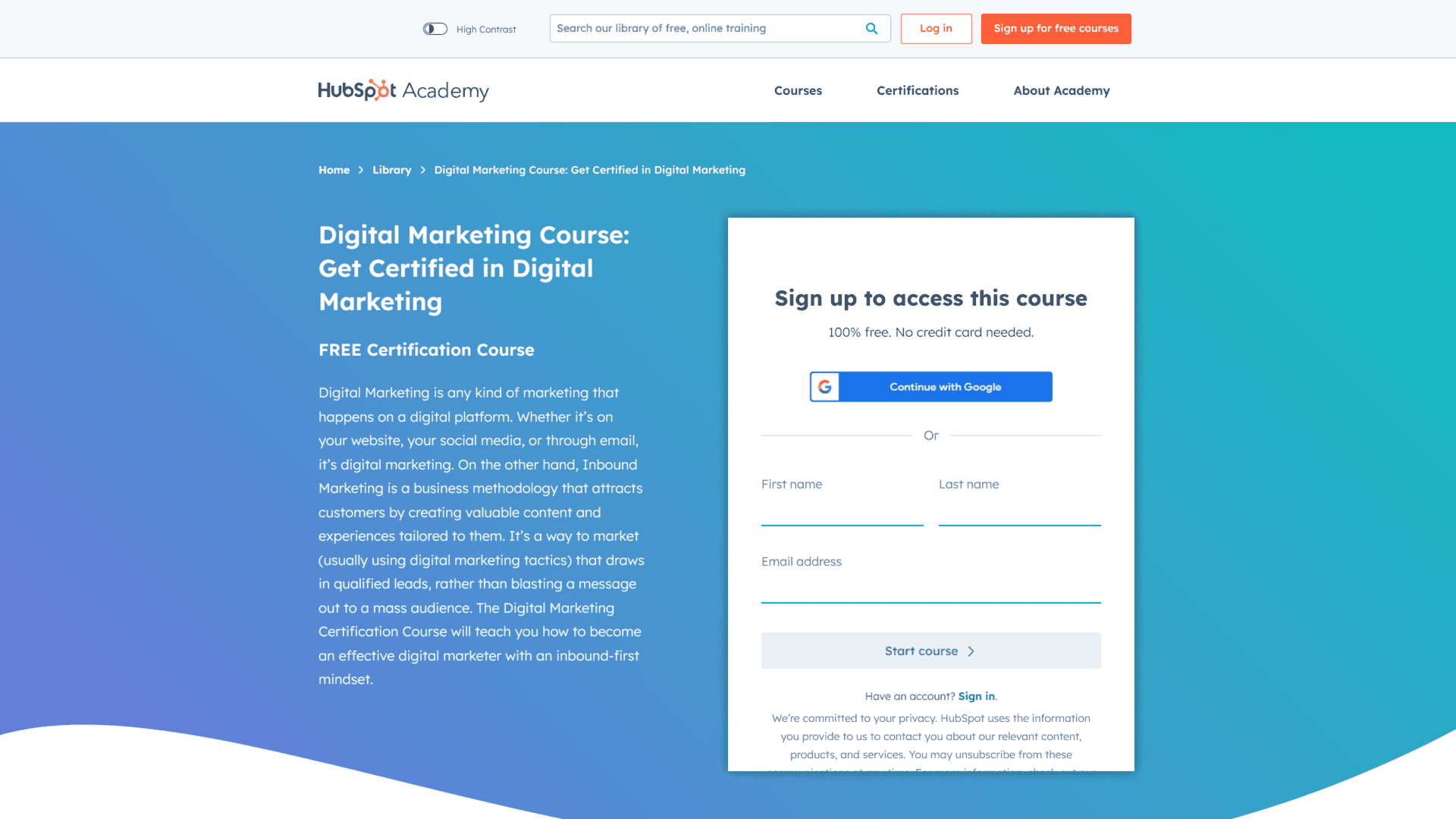
Most digital marketing tools are designed to serve one purpose, but HubSpot Marketing Hub, made by the famous business-oriented software company HubSpot, is a comprehensive marketing tool that combines many features into one cloud-based app.
The two major features of HubSpot’s software are marketing automation and email marketing tools, but there are many more, such as customer segmentation, A/B testing, analytics tools, social media marketing tools, and more.
It also provides SEO support and templates for landing page designs, websites, and marketing emails, all of which offer fantastic inspiration to help you finish your ad campaign.
Note that some features are locked behind tiered pricing plans, though. There are four plans in total, including a free version. And as your business grows, the software can scale with you.
Also, HubSpot Marketing Hub integrates well with other customer relationship management (CRM) tools that HubSpot provides, so you can conveniently go for the whole package if you want.
Key Features
- Email marketing tools
- Marketing automation
- Analysis tool for customers and leads
- A/B testing
- SEO support
- Landing page and email templates
- CRM integration
Pricing
HubSpot Marketing Hub offers a free plan in addition to three premium ones:
- Starter: $45/month
- Professional: $800/month
- Enterprise: $3,600/month
The Bottom Line
HubSpot Marketing Hub is one of the most comprehensive online marketing tools. It combines many features in one application and integrates well with HubSpot’s other CRM tools. There’s also an entirely free plan, so you can try it if you’re on the fence.
2. Buffer
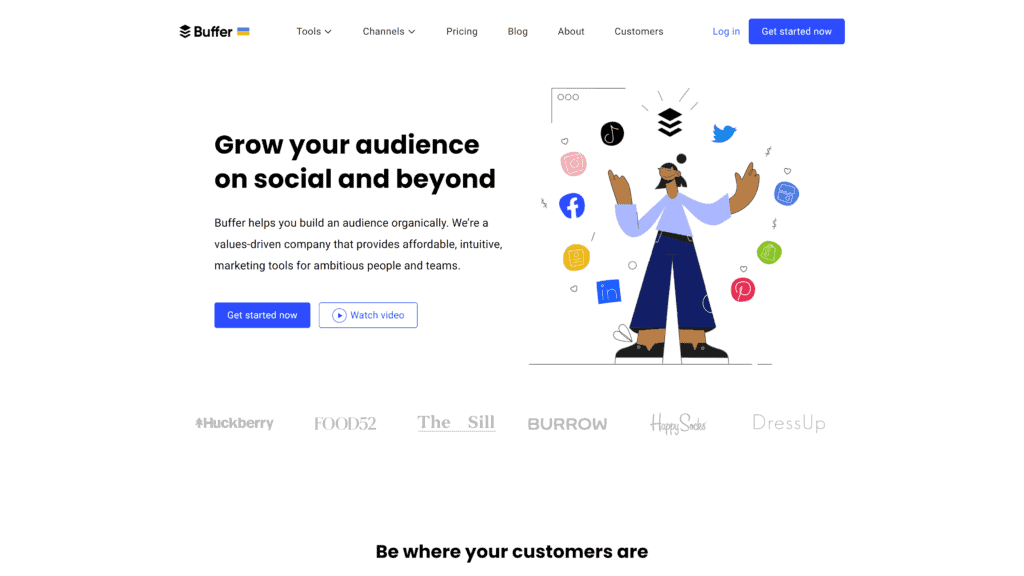
Buffer is a social media management tool that allows you to manage multiple platform accounts simultaneously.
Many years ago, social media marketing was mainly confined to Facebook. But as other platforms rose to the highest stage, marketers now have to adjust to other social media platforms.
Of course, that was a problem for marketers, whose schedules were quickly filled up. Then came Buffer, initially a Twitter post scheduler that was later expanded to support more platforms, such as Facebook, Instagram, TikTok, LinkedIn, and Pinterest.
At that point, you could draft social media posts and schedule them for later.
But Buffer didn’t stop innovating there. It later implemented analytics to help you see how each post performs on each platform. For instance, you can see how effective your Instagram ads are compared to your Facebook ads.
In turn, you can use these analyses to refine your content strategy as you keep generating leads.
Key Features
- Schedule posts on major social media platforms
- Built-in calendar for easy overview
- Collaboration features
- Performance analysis tools
Pricing
There’s a free plan on Buffer with some basic publishing tools and a landing page builder. The more advanced features are available in these two premium plans:
- Essentials: $6/month
- Team: $12/month
The Bottom Line
Buffer is a marketing essential if you maintain multiple pages on various social media accounts, as it can save you a lot of time with its drafting and scheduling tool.
3. Canva

Canva is one of the kings of graphic design, so it’s no surprise it makes our list seeing how important it is for most marketing campaigns.
On the Canva app, you can create fabulous visuals using its easy-to-use drag-and-drop feature. And with a bit of creativity, the result is sleek, professional-looking, and ready-to-publish content.
You can also create infographics using templates and custom fonts from Canva’s vast library or videos to promote your new product or service.
Or, if you want to have a laugh with your audience, you can make a trendy meme that relates to their struggles.
Whatever visual design path you want on your social media campaign, Canva has you covered. And many small and medium businesses have seen great success using it for years.
Key Features
- Drag-and-drop tool
- Vast template center
- Beginner-friendly interface
- Learning resources available
Pricing
Canva offers a free version and two premium pricing plans at these prices:
- Pro: $12.99/month
- Teams: $14.99/month
The Bottom Line
Marketing campaigns need a graphic editing tool to create professional visuals. And for most marketers, Photoshop is too overkill, so Canva is the best option, thanks to its intuitive drag-and-drop feature and learning resources.
4. Hootsuite
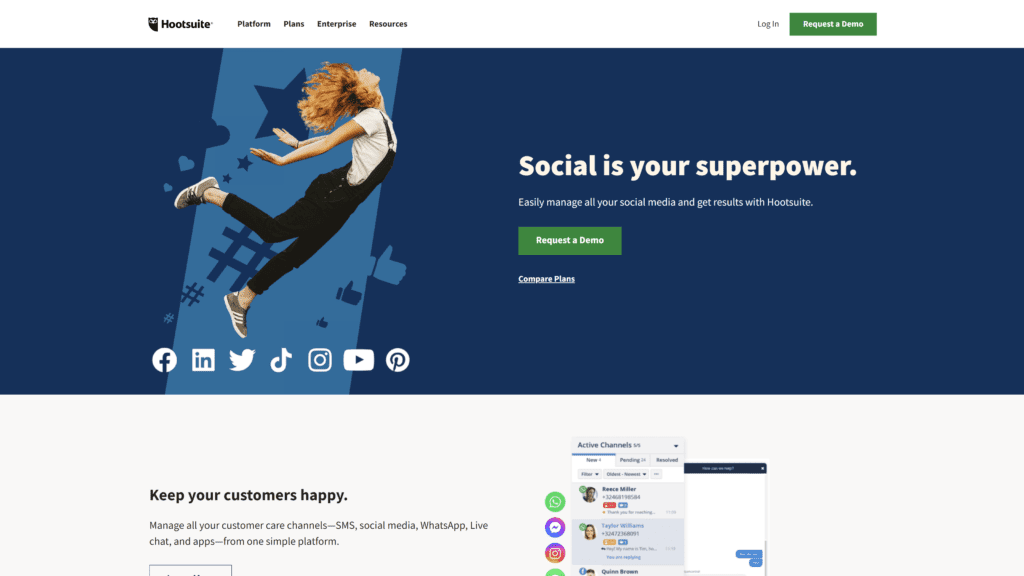
Hootsuite is a massive cloud-based program full of social media management features to help teams work together on advertising campaigns.
Aside from its basic social media tools like post drafting and scheduling, Hootsuite acts as a workspace (or suite, hence the name) for the team dedicated to your social media presence.
The Hootsuite workspace allows you to manage all your social media accounts from one login. For example, team members can interact with comments and mentions on your posts without even logging into the social media platform in question.
You can grant other people access to the workspace as well, enabling valuable communication in a speedy manner. However, the amount of collaborators you can add depends on your pricing plan.
And, of course, you have analysis tools to keep up with the performance of your campaign. There’s even a tracking (“social listening”) tool that lets you follow terms and hashtags of your choosing, though these can crowd your dashboard if you go all-out with them.
Key Features
- Draft and schedule posts
- Duplicate posts to reach multiple time zones
- Manage all your social media accounts in one app
- Add team members to your workspace for collaboration
- Analytics and keyword tracking
Pricing
Hootsuite offers four paid plans at these prices:
- Professional: $49/month
- Team: $249/month
- Business: $739/month
- Enterprise: Custom quote
The Bottom Line
If your company has multiple social media profiles, Hootsuite’s project management tools can save you a ton of time and effort by combining everything in one interface and allowing you to work with your team on it.
5. Ahrefs
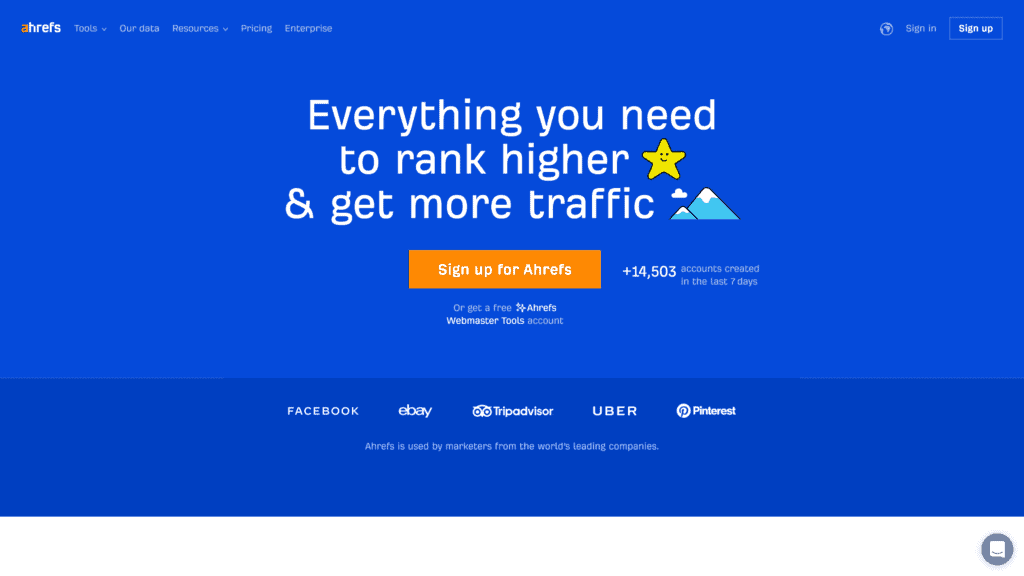
To increase your website traffic, you need to focus on search engine optimization. And one of the best tools you can use to optimize a website is Ahrefs.
Ahrefs is one of the most popular SEO tools in the market today. It’s heavily favored by small business owners and web developers but also large corporations, thanks to its many features that give you complete backlink analysis.
The signature feature of Ahrefs is the site explorer, which gives you a thorough SEO performance analysis of any website, displaying metrics such as organic traffic, backlinks index, Ahrefs rank, referring domains, and more.
The backlink checker on Ahrefs has one of the biggest indices on the Internet, thanks to its powerful web crawler. Moreover, you get sorting and filtering tools that make analysis easier.
There’s also the organic search feature, which extracts the top keywords in your industry based on your competitors’ websites, allowing you to come up with keyword ideas.
Key Features
- Active website crawler
- Backlink checker with thorough analyses
- Organic search displays relevant keywords
- SEO performance analytics
- SERP analysis tools
Pricing
Ahrefs offers four pricing plans at these prices:
- Lite: $99/month
- Standard: $199/month
- Advanced: $399/month
- Enterprise: $999/month
The Bottom Line
Ahrefs is one of the best tools you’ll find for ranking your website. It has tools for SEO, backlink checking, keyword research, SERP analysis, and more. And its web crawler is one of the most active online, so you can trust its findings.
6. Mailchimp
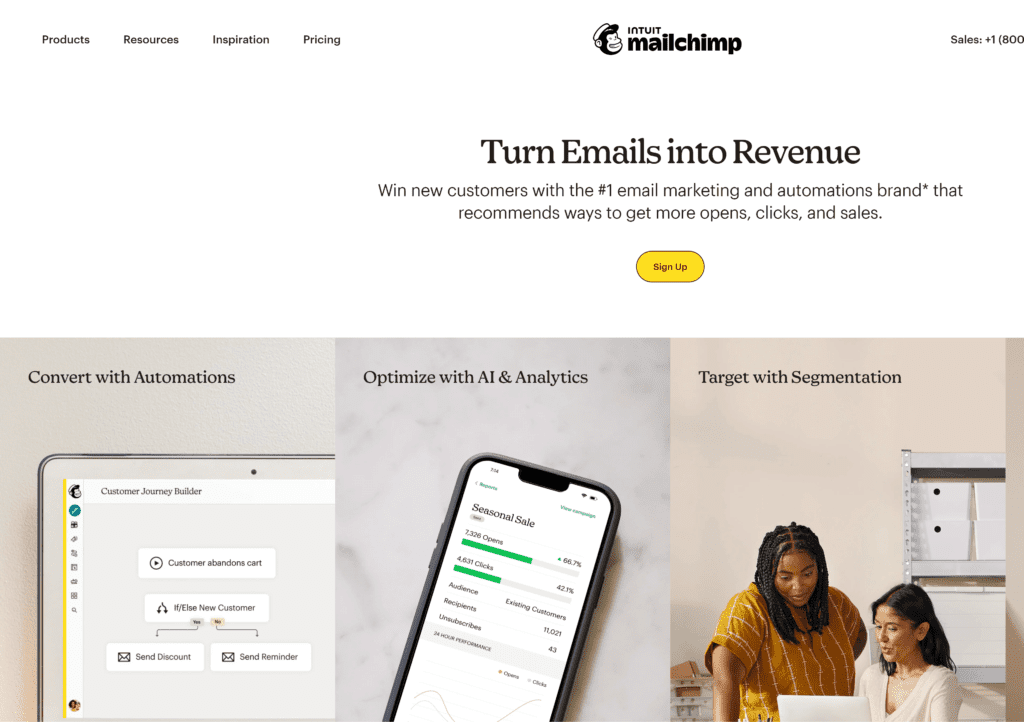
Mailchimp is an email marketing tool known for its automation tools and management interface that leads you through the entire campaign.
If you’re new to email marketing, you’ll enjoy Mailchimp’s intuitive interface and drag-and-drop tool that lets you customize your email campaigns as you please. Plus, it’ll give you a neat introduction to this type of marketing.
And for those with a more technical background who want maximum customizability, you can modify your email templates or create new ones by modifying the HTML source code.
But even if you don’t have any, you can still use any of Mailchimp’s beautiful templates and customize them with the editing tool. You’ll also get some neat recommendations from Mailchimp’s AI to help you refine your strategy.
Lastly, Mailchimp has expanded over the years to a more comprehensive marketing tool. Nowadays, there are add-ons to give you more features, such as a CRM tool, custom domains, and a web designer tool.
Key Features
- Professional email templates
- Email marketing automation
- Customizability through drag-and-drop or HTML
- AI-backed recommendations
- Additional top digital marketing tools
Pricing
Mailchimp has a free package that allows up to 500 contacts. If you want more, you’ll need to choose one of their three premium plans.
The plans don’t have a fixed price. Instead, it depends on how many contacts you have. Assuming you have 5,000 contacts, here are the prices:
- Essentials: $59/month
- Standard: $90/month
- Premium: $299/month
The Bottom Line
Mailchimp is a powerful email marketing tool that’s been used in thousands of marketing campaigns over the years. Nowadays, it comes with additional digital marketing tools that you might find useful as well.
7. Semrush
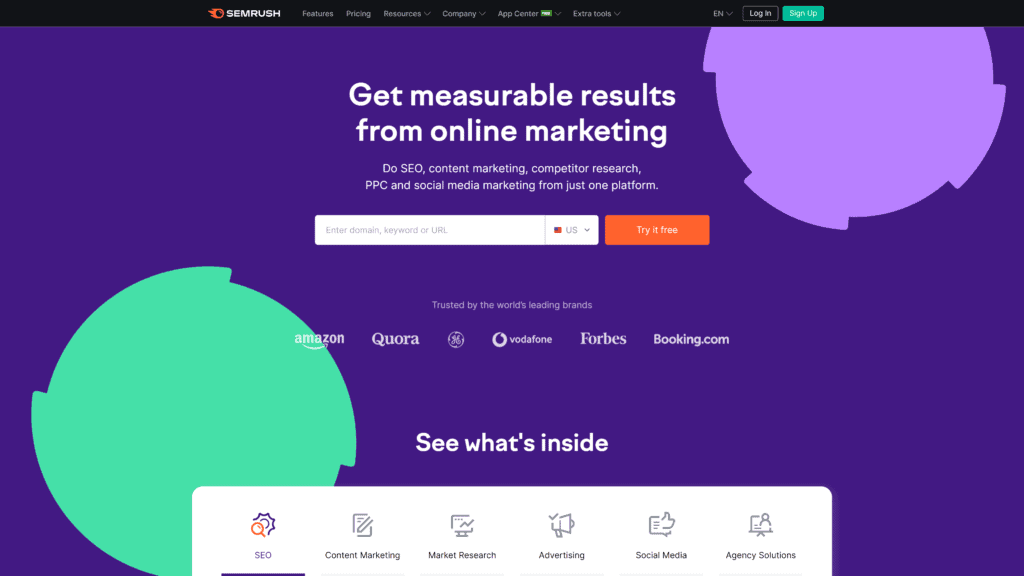
If you’ve worked on SEO before, chances are you’ve heard of Semrush. It’s been around for well over a decade and has gained quite a reputation for its efficacy as an SEO tool.
When you enter a domain into the Semrush main dashboard, you get a clear breakdown of phrase-match keywords, organic and paid search, relevant trends, a cost-per-click distribution graph, and a list of related terms.
As for the Semrush backlink database, it’s pretty huge, despite being behind Ahrefs’ massive backlink index. Still, it’s enough to satisfy most people as you can get valuable information on your competitors’ backlinks.
Another staple feature of Semrush is the keyword overview, which breaks down keywords into several metrics, such as local and global volume, cost per click, variations, relevant questions, difficulty, and more.
As for content writers, you’ll enjoy Semrush’s SEO content template tool, which analyzes the top 10 results from Google to craft the best possible keyword list.
Key Features
- Plenty of SEO and SEM tools
- Thorough link analysis with a huge backlink index
- Automated content writing templates
- Keyword overview and detailed breakdowns
- Social listening available
Pricing
There are three paid plans on Semrush with free 7-day trials available. They are:
- Pro: $119.95/month
- Guru: $229.95/month
- Business: $449.95/month
Additionally, large enterprises can request a more advanced plan if these don’t suffice their needs at a custom quote by contacting the Semrush team.
The Bottom Line
Semrush is a prominent icon in the world of SEO tools. It’s been around for a long time and so far has stood the test of time with flying colors, thanks to its multitude of valuable features.
8. Loomly
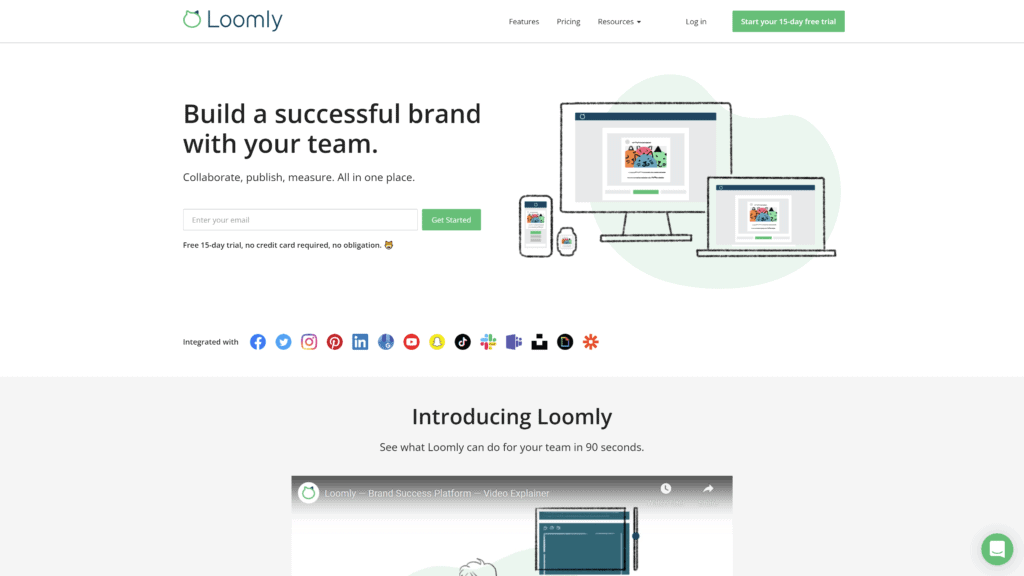
Loomly is a digital marketing tool designed to help you organize your social media marketing campaign through a user-friendly interface that provides you with the tools you need.
Marketers and account managers can benefit from Loomly’s ability to handle multiple social media profiles at once, cutting down the valuable time that they’d otherwise spend adjusting for different platforms.
You also get access to collaboration features, so it’s easy for everyone in the team to get involved and finish their tasks on time. And there are plenty of options with how you assign people different tasks, grant them access to calendars, and separate them into teams.
Speaking of calendars, you get access to the content calendar feature, which you can customize with your client’s company name, logo, and industry, then fill with the content you want to post on their accounts and schedule it for fixed times.
Lastly, you can measure the performance of the content you posted through Loomly’s analysis tools to see what type of content appeals to your audience and helps in lead generation.
Key Features
- Intuitive social media marketing manager
- Draft, schedule, and preview posts
- Content calendar creator
- Collaboration tools
- Analysis tools to measure performance
Pricing
There are no free pricing plans on Loomly. Instead, you can try the free trial for 15 days before picking one of these five paid plans:
- Base: $35/month
- Standard: $79/month
- Advanced: $172/month
- Premium: $359/month
- Enterprise: Custom quote
The Bottom Line
Loomly is a valuable social media tool that can help teams efficiently work on multiple accounts and create content calendars for their clients. Plus, its pricing plans are easily scalable.
9. Google Analytics
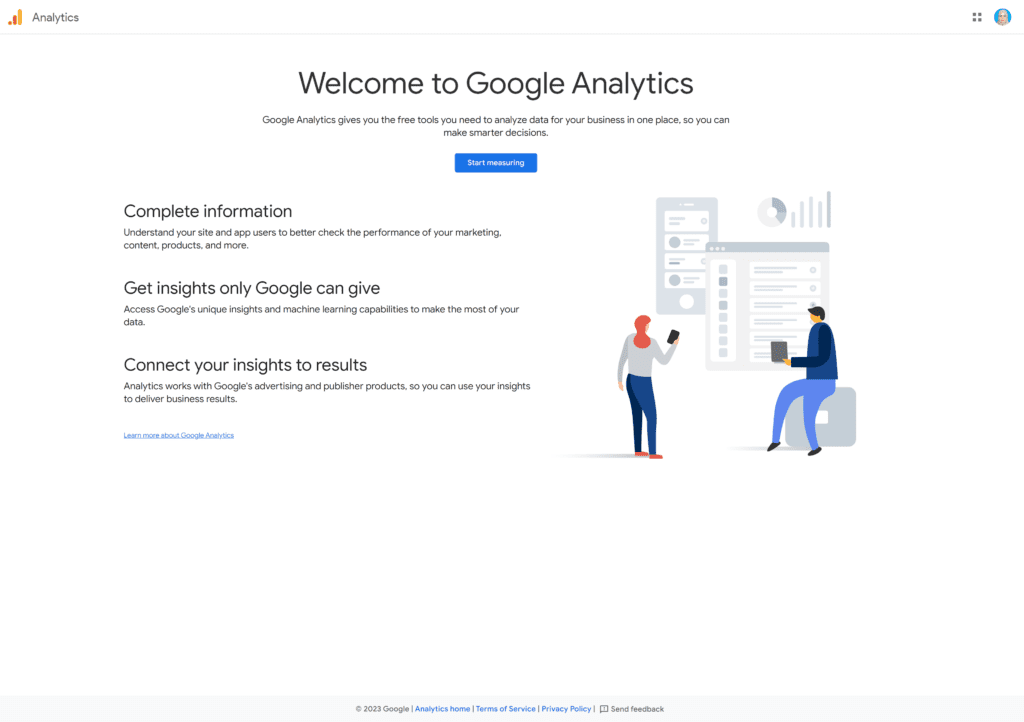
We couldn’t end our list without talking about the cream of the crop of analysis tools: Google Analytics.
Google Analytics is the undisputed king of modern intelligent analysis—no question about it. After all, other tools strive to satisfy Google’s web crawler. So when Google itself has a tool for this, you know you can rely on it.
This also means that Google can give you a deeper analysis of your website and the incoming traffic. For example, the acquisition section breaks down whether people found your website through organic search, direct search, referrals, or others.
There’s also a behavior section, which shows a customer journey report and details on which pages are visited the most often, where your visitors click, and how much time they spend on your website.
You can also see detailed analyses of your most popular pages, including conversion rates. And, most importantly, it’s free!
Key Features
- Developed and supported by Google
- Deep analysis of incoming traffic
- Breakdown of most popular pages
- See customer behavior and conversion rates
- Completely free
Pricing
Google Analytics is free of charge. You’ll only pay if you use the premium version of the digital marketing tool, Google Analytics 360.
The Bottom Line
Google Analytics is a must-try for anyone who wants to leverage the potential of useful data. It’s the gold standard of analysis tools and provides detailed feedback on valuable metrics around your website and its traffic.
Final Words
These were some essential digital marketing tools to help you get your campaign out more effectively, refine your strategy, and learn more about your clients while saving time.
One of our rules of thumb is that an excellent digital marketing tool allows you to achieve the most in the least steps possible, so keep that in mind when considering other tools.
Also, remember that most tools work together to achieve the desired results. For instance, you could write your content using AI generation tools, add some visuals using a graphic editor, post it on your platforms using a social media manager, analyze the results with an analysis tool, and so on.






